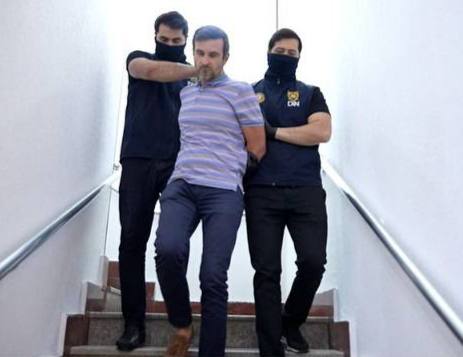The Russian police raids in Yekaterinburg targeting the Azerbaijani diaspora appear to have been triggered by a complex mix of internal intelligence turf wars, geopolitical messaging to Baku, and concerns over organized crime tied to foreign ethnic networks. The main causes behind these raids:
1. FSB Infighting and Rogue Operations
🔍 Key Cause: Internal Security Service Rivalry
- The arrested individuals in Yekaterinburg were allegedly linked to rival factions within the FSB or acted outside Moscow’s direct control, using their connections within the Azerbaijani diaspora to run unauthorized surveillance, protection rackets, or smuggling operations.
- This suggests that the raids may have been part of a power struggle inside Russian security services, aimed at reasserting central control over intelligence operatives with diaspora ties.
2. Organized Crime and Extortion Crackdown
Key Cause: Transnational Criminal Networks
- The Azerbaijani diaspora in Yekaterinburg has long had a powerful role in local markets, especially in construction, produce trade, and the informal economy. Some networks reportedly function as mafia-type structures.
- Russian authorities likely used criminal pretexts—extortion, illegal arms, human trafficking, or financial fraud—to justify a broader crackdown that also served political aims.
3. Message to Baku After Sputnik Arrests
Key Cause: Geopolitical Retaliation
- The raids came just days after Azerbaijani authorities detained Sputnik Azerbaijan staff in Baku, accusing them of acting as foreign agents and spreading Kremlin propaganda.
- Moscow may have ordered retaliatory pressure on diaspora groups to send a message to the Aliyev government: “We can touch your people inside Russia.”
4. Ethnic Tension Management Before Elections
Key Cause: Preemptive Stability Measures
- With regional elections approaching and growing nationalist sentiment inside Russia, the Kremlin may be trying to tighten control over large ethnic minority diasporas like the Azerbaijanis, Uzbeks, and Chechens.
- Yekaterinburg, being a diverse and economically vital city, has seen periodic ethnic tensions, and the raids may serve as a signal to deter unrest or dissent.
5. Anti-Turkic Sentiment and Pan-Turkic Fears
Key Cause: Suspicion of Turkish Influence
- As Azerbaijan deepens its ties with Turkey and the Organization of Turkic States, Russian officials increasingly fear that pan-Turkic ideas are spreading within their own Turkic-speaking populations (Tatars, Bashkirs, etc.).
- Yekaterinburg, with its central location and large migrant communities, may be seen as a hotspot for ideological influence from Baku or Ankara.
6. Preventing Double Loyalty Networks
🔍 Key Cause: Diaspora as Intelligence Backdoor
- Russian security services are increasingly suspicious of dual-use diaspora actors—those who simultaneously cooperate with Russian agencies and maintain deep connections to Baku.
- The Yekaterinburg raids may have aimed to eliminate dual-loyalty risks and bring diaspora groups more directly under FSB command.
Intelligence Message Disguised as Law Enforcement
The Yekaterinburg raids were nominally about crime, but they served deeper purposes:
- Enforcing FSB discipline.
- Retaliating against Azerbaijan’s anti-Russian steps.
- Reasserting control over a transnational ethnic network.
- Warning Baku that its diaspora is vulnerable inside Russia.
These moves reflect a shift in Moscow’s approach to the South Caucasus: increasingly coercive, less cooperative, and rooted in fear of losing its last remaining levers of influence.
Recent events—including the detention of Sputnik Azerbaijan staff by Azerbaijani security services—highlight a sharp deterioration in the traditionally pragmatic relationship between Russia and Azerbaijan. These developments reveal a growing clash of interests between Moscow’s covert influence operations and Baku’s assertive drive to insulate itself from Russian leverage. As Azerbaijan pivots more decisively toward Turkey and seeks to limit Moscow’s soft and hard power reach, tensions are likely to escalate across multiple domains: diaspora management, media influence, intelligence activity, and regional integration projects.
I. Background: A Fragile Understanding
Since the collapse of the Soviet Union, Russia and Azerbaijan have maintained a transactional, often cautious relationship. While Moscow supported Armenia in the first Karabakh war, it shifted to a more balanced, and at times Azerbaijan-leaning, posture in recent years to counter growing Turkish and Western influence in the South Caucasus. However, Azerbaijan’s strategic autonomy has increasingly clashed with Russia’s deep-state attempts to exert control via intelligence operations, diaspora networks, and media instruments like Sputnik.
II. Arrests in Yekaterinburg: FSB Influence within Azeri Diaspora
In June 2025, Russian authorities arrested several Azerbaijani nationals in Yekaterinburg, reportedly tied to FSB structures, over internal disputes involving smuggling, extortion, or unauthorized surveillance in 2001-2011. These arrests mark a rare public breach in the usual collaboration between the FSB and elements of the Azeri diaspora, which has long served as a tool for Russian influence in Central Russia and the North Caucasus.
Key Issues:
- Internal FSB Rivalry: Some reports suggest that the arrested individuals were linked to rival FSB factions or used diaspora ties for unsanctioned operations.
- Diaspora Instrumentalization: The Azerbaijani community in Russia, estimated at over 1.5 million, has traditionally been a lever of both influence and vulnerability in Azeri-Russian relations.
- Blowback in Baku: Azerbaijani authorities may interpret these arrests as Moscow’s attempt to signal dominance or retaliate for Baku’s independent moves.
III. Sputnik Azerbaijan Raids: Media as a Battleground
The raid in the office of Sputnik Azerbaijan in Baku, detaining several journalists and accusing them of spreading pro-Russian propaganda and operating as unregistered foreign agents. The crackdown followed broader efforts to curtail Russian information warfare tools ahead of the 2025 parliamentary elections in Azerbaijan and amid growing concern about destabilizing narratives related to Karabakh and relations with Iran.
Reasons Behind the Crackdown:
- Counterintelligence Concerns: Sputnik staff reportedly had close ties to Russian diplomatic and intelligence networks in Baku.
- Geopolitical Messaging: Azerbaijan is asserting that Russian soft power will no longer be tolerated unconditionally, particularly in media and educational spheres.
- Preemptive Strategy: With the regional environment in flux, Baku is proactively cutting off vectors of potential interference.
IV. Regional and Strategic Consequences
A. Bilateral Relations: A Downward Shift
- Trust Deficit: The events have triggered a significant erosion of trust, with Russian media framing the arrests in Baku as “Russophobic” and Azerbaijani outlets highlighting the dangers of Russian infiltration.
- Retaliatory Measures: Russia may respond through informal economic pressure (e.g., delays for Azeri trucks or migrants) or covert influence operations inside Azerbaijan.
- Reduced Coordination: Joint initiatives such as energy cooperation, customs integration in the North Caucasus, or regional security talks may stall or be downgraded.
B. Impact on Russian Influence in the Caucasus
- Media and Intelligence Networks Weakened: The closure of Sputnik’s operations in Baku and scrutiny of FSB-linked individuals weakens Russian operational reach in the South Caucasus.
- Loss of Strategic Entry Points: Azerbaijan’s diaspora and media have served as useful backdoors for Russian narratives; losing them disrupts Moscow’s soft power matrix in the region.
C. Turkish Leverage Expands
- Ankara Benefits: Turkey gains by default from the Azeri-Russian rift, solidifying its role as Azerbaijan’s primary strategic partner in defense, energy, and media.
- Turkic World Realignment: The events may accelerate Azerbaijan’s deeper integration into Turkic regional blocs, sidelining Moscow.
V. Domestic Implications for Azerbaijan and Russia
Azerbaijan:
- National Sovereignty Narrative Strengthened: President Ilham Aliyev can leverage the crackdown to reinforce an image of strength and independence.
- Tightened Information Space: Media independence may shrink under the guise of “anti-propaganda measures”, which also affects non-Russian outlets.
Russia:
- Internal Surveillance Escalates: The FSB is likely to initiate purges or tighten control over diaspora-linked operatives to prevent future exposures.
- Strained Public Diplomacy: Russian messaging around “brotherly ties” with Baku is undercut, complicating narratives in other post-Soviet Muslim-majority republics.
VI. Scenarios and Outlook
| Scenario | Description | Likelihood | Impact |
| Escalation | Mutual expulsions, media blackouts, tightening of borders or visa regimes | Medium | High |
| Normalization via Turkey | Turkey brokers informal detente to maintain trilateral coordination (e.g., Zangezur corridor) | Medium-High | Moderate |
| Covert Competition | Azerbaijan and Russia engage in shadow competition through economic levers and diaspora groups | High | Medium |
VII. Conclusion: Strategic Realignment in Motion
The dual crises in Yekaterinburg and Baku mark more than isolated incidents; they signal a strategic recalibration in Azerbaijan’s approach to Russia. As Baku asserts control over its information environment and diaspora ties, and as Moscow reacts with suspicion and resentment, a new phase of limited, distrustful coexistence is likely to emerge. The long-term effect may be a regional power balance tilted more heavily toward Turkey, with Moscow scrambling to retain relevance in a region it once dominated.
Recommendations for Policymakers
- Monitor Russian Diaspora Operations: Other South Caucasus and Central Asian states should assess the role of their own diaspora networks within Russia.
- Support Independent Media in Azerbaijan: Western actors should engage cautiously to prevent a vacuum being filled solely by state-aligned or Turkish media.
- Encourage Regional Dialogue Mechanisms: Multilateral formats like the Ankara-Baku-Tbilisi axis should be supported to reduce friction and prevent escalation.
- Watch for Russian Countermoves: Intelligence and cybersecurity services across the region must remain vigilant to potential Russian retaliatory subversion.
The situation absolutely impacts Armenia, both directly and indirectly:
I. Armenia as a Strategic Beneficiary (Temporarily)
With Russia-Azerbaijan tensions escalating, Armenia may enjoy temporary breathing space, especially in the diplomatic and security domains:
- Reduced Russian-Azerbaijani Coordination: When ties between Moscow and Baku are strained, the risk of Russia facilitating Azeri military or political pressure on Armenia (as it arguably did in the past) is reduced.
- FSB Distraction: Russian intelligence agencies may be forced to shift focus to managing fallout with Baku and internal diaspora control, easing pressure on pro-Western shifts in Yerevan.
- Sputnik Scrutiny as a Precedent: Armenia may use Baku’s crackdown on Sputnik to justify tighter control over Russian propaganda and information warfare tools at home, especially amid rising anti-Russian sentiment.
II. Limits to Armenian Gains
However, Armenia’s strategic position remains precarious. The fallout could provoke dangerous side effects:
- Russia’s Need for a New Regional Partner: As Baku distances itself, Moscow may try to reassert influence over Armenia, exploiting Yerevan’s military and economic vulnerabilities, particularly if EU and U.S. assistance is slow or limited.
- Increased Regional Instability: If Azerbaijan pivots fully to Turkey and the Turkic world, the geopolitical isolation of Armenia may deepen, especially without Russian protection or CSTO security guarantees.
- Diaspora Risks: Armenians in Russia—already under scrutiny—could come under greater pressure as Moscow intensifies surveillance and crackdowns on foreign ethnic communities following the Azeri arrests.
III. Armenia’s Strategic Dilemma
Armenia faces a delicate balancing act:
- Embrace Western and EU ties more fully, possibly provoking Russian retaliation.
- Try to remain neutral or mediate quietly between Moscow and Baku—a difficult and risky stance, given recent history.
- Deepen ties with Iran, risking secondary sanctions or regional complications.
IV. Potential Scenarios for Armenia
| Scenario | Impact on Armenia |
| Russia-Azerbaijan crisis escalates | Armenia benefits in the short term from reduced Russian favoritism toward Baku, but risks Russian demands for loyalty. |
| Turkey fills Russian vacuum | Armenia’s strategic isolation worsens; corridor projects (e.g., Zangezur) may gain momentum under Turkish-Azeri initiative. |
| Russia retaliates against both Baku and Yerevan | Armenia faces increased hybrid pressure (cyberattacks, information warfare, economic retaliation) for its Western tilt. |
| Mediation opportunity | Armenia, perhaps with EU backing, could try to present itself as a stabilizing actor in the South Caucasus—but credibility is limited. |
Short-Term Relief, Long-Term RiskWhile Armenia may benefit short-term from reduced Russian-Azeri alignment, it also faces new uncertainties. Russia’s declining influence in Baku could lead to increased pressure on Armenia to remain loyal, or even act as a proxy to contain Turkish-Azeri cooperation. Without a strong, coherent Western support strategy, Armenia risks being caught in a more volatile and polarized South Caucasus.




